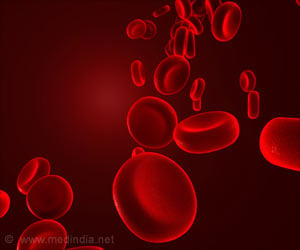Scientists have discovered two enzymes produced by gut bacteria that can convert type A into type O blood (which can be given to persons of all blood types). This finding could revolutionize blood banking and prevent blood shortages.
Highlights:
- Scientists have discovered two enzymes formed by gut bacteria that can convert type A blood into type O blood
- There are four blood types (A, B, AB and O), and only type O can be given to persons of any blood type during an emergency. Giving any other non-matching blood can be life-threatening
- However, this new discovery could revolutionize blood banking and help overcome the constant blood shortages faced by hospitals across the world
Read More..
Why O Type Blood Is Considered As Universal Donor?
- In blood banking, the person who donates blood is termed a donor and the person receiving the blood is termed recipient
- There are four blood types (A, B, AB and O); only type O can be given to persons of any blood type (since type O is universal donor blood) during an emergency if the exact required type is not available
- For instance, if a person with type A blood is mistakenly given blood transfusion with type B blood, the B type proteins in the transfused blood will induce a potentially life-threatening reaction by the immune system of the patient which recognizes the B antigenic protein as a foreign entity
- However, type O red blood cells have no A or B antigens on their surface; instead, they carry a neutral “H” antigen and don’t induce any reaction in the recipient; therefore O type blood can be safely given to persons of all blood types
- On any given day, in medical centers across the US alone, there is a need for about 16,500 liters (35,000 pints) of donated blood for emergency surgeries, elective surgeries that have been prescheduled and routine transfusions for other medical conditions. Consequently, there is a constant shortage if the required blood type or sufficient supply of type O is not available in the hospital blood bank. The scenario is pretty much the same worldwide
- Thus in blood banking, O type blood is considered highly valuable
Converting Type A Blood to Type O Blood
- Type A blood is the second most common blood type after O blood. If type A blood can be converted to type O blood, this could revolutionize blood banking and prevent existing blood shortages across the world
- Until now efforts to convert type A blood to type O have met with limited success since the earlier enzymes were not able to completely remove the A antigen and the process was not economical
- The current research team led by Stephen Withers, a chemical biologist at the University of British Columbia (UBC) in Vancouver, Canada, decided to look for a better enzyme among the gut bacteria after trying unsuccessfully for four years
- Some of these gut bacteria latch onto the gut wall, and “eat” the mucin that lines the gut wall. The gut mucin is a glycoprotein chemically similar to the antigenic protein on the surface of the red blood cells
- During their research, the team isolated the bacteria Flavonifractor plautii from human stools, and found genes that encode two enzymes that could remove important parts of the surface A antigen from type A blood
- When these two enzymes were added to type A blood, they efficiently removed the A antigen from the red blood cells, essentially converting them to type O blood
- The O type blood thus obtained could be given to any patient without inducing an immune reaction
Future Plans
The future studies will aim to ensure the complete safety of the converted type O blood.- The team to carry out more research to ensure that gut bacterial enzymes completely all the A antigen present in type A blood
- They also need to ensure that the bacterial enzymes do not change anything else on the red blood cells that could create problems later
Reference:
- Type A blood converted to universal donor blood with help from bacterial enzymes - (https://www.sciencemag.org/news/2019/06/type-blood-converted-universal-donor-blood-help-bacterial-enzymes)
Source-Medindia
















